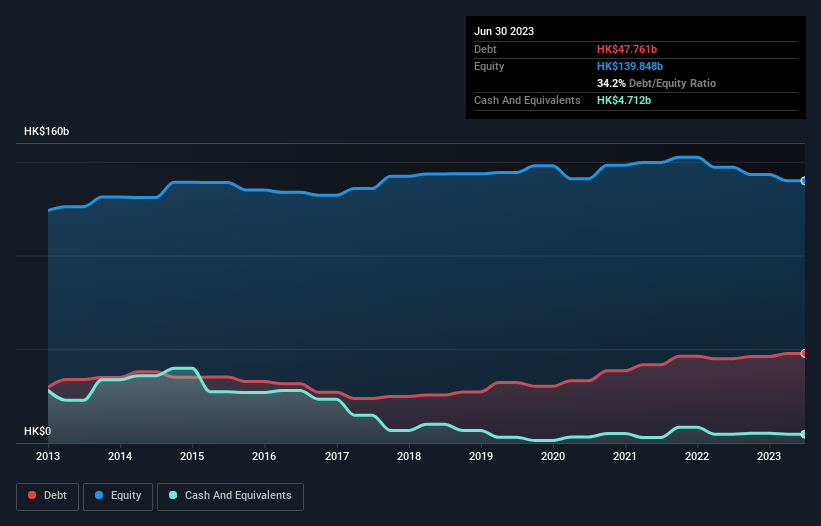- Hong Kong
- /
- Real Estate
- /
- SEHK:101
We Think Hang Lung Properties (HKG:101) Is Taking Some Risk With Its Debt

Some say volatility, rather than debt, is the best way to think about risk as an investor, but Warren Buffett famously said that 'Volatility is far from synonymous with risk.' So it might be obvious that you need to consider debt, when you think about how risky any given stock is, because too much debt can sink a company. We note that Hang Lung Properties Limited (HKG:101) does have debt on its balance sheet. But should shareholders be worried about its use of debt?
When Is Debt A Problem?
Debt assists a business until the business has trouble paying it off, either with new capital or with free cash flow. If things get really bad, the lenders can take control of the business. While that is not too common, we often do see indebted companies permanently diluting shareholders because lenders force them to raise capital at a distressed price. Of course, the upside of debt is that it often represents cheap capital, especially when it replaces dilution in a company with the ability to reinvest at high rates of return. When we examine debt levels, we first consider both cash and debt levels, together.
View our latest analysis for Hang Lung Properties
How Much Debt Does Hang Lung Properties Carry?
The image below, which you can click on for greater detail, shows that at June 2023 Hang Lung Properties had debt of HK$47.8b, up from HK$44.9b in one year. However, it does have HK$4.71b in cash offsetting this, leading to net debt of about HK$43.0b.

How Healthy Is Hang Lung Properties' Balance Sheet?
We can see from the most recent balance sheet that Hang Lung Properties had liabilities of HK$14.2b falling due within a year, and liabilities of HK$56.5b due beyond that. On the other hand, it had cash of HK$4.71b and HK$3.71b worth of receivables due within a year. So it has liabilities totalling HK$62.3b more than its cash and near-term receivables, combined.
When you consider that this deficiency exceeds the company's HK$50.8b market capitalization, you might well be inclined to review the balance sheet intently. Hypothetically, extremely heavy dilution would be required if the company were forced to pay down its liabilities by raising capital at the current share price.
We use two main ratios to inform us about debt levels relative to earnings. The first is net debt divided by earnings before interest, tax, depreciation, and amortization (EBITDA), while the second is how many times its earnings before interest and tax (EBIT) covers its interest expense (or its interest cover, for short). Thus we consider debt relative to earnings both with and without depreciation and amortization expenses.
As it happens Hang Lung Properties has a fairly concerning net debt to EBITDA ratio of 6.3 but very strong interest coverage of 16.5. So either it has access to very cheap long term debt or that interest expense is going to grow! Importantly Hang Lung Properties's EBIT was essentially flat over the last twelve months. Ideally it can diminish its debt load by kick-starting earnings growth. There's no doubt that we learn most about debt from the balance sheet. But ultimately the future profitability of the business will decide if Hang Lung Properties can strengthen its balance sheet over time. So if you want to see what the professionals think, you might find this free report on analyst profit forecasts to be interesting.
Finally, a business needs free cash flow to pay off debt; accounting profits just don't cut it. So we clearly need to look at whether that EBIT is leading to corresponding free cash flow. Over the most recent three years, Hang Lung Properties recorded free cash flow worth 52% of its EBIT, which is around normal, given free cash flow excludes interest and tax. This cold hard cash means it can reduce its debt when it wants to.
Our View
Mulling over Hang Lung Properties's attempt at managing its debt, based on its EBITDA,, we're certainly not enthusiastic. But on the bright side, its interest cover is a good sign, and makes us more optimistic. Looking at the balance sheet and taking into account all these factors, we do believe that debt is making Hang Lung Properties stock a bit risky. That's not necessarily a bad thing, but we'd generally feel more comfortable with less leverage. In light of our reservations about the company's balance sheet, it seems sensible to check if insiders have been selling shares recently.
If you're interested in investing in businesses that can grow profits without the burden of debt, then check out this free list of growing businesses that have net cash on the balance sheet.
Valuation is complex, but we're here to simplify it.
Discover if Hang Lung Properties might be undervalued or overvalued with our detailed analysis, featuring fair value estimates, potential risks, dividends, insider trades, and its financial condition.
Access Free AnalysisHave feedback on this article? Concerned about the content? Get in touch with us directly. Alternatively, email editorial-team (at) simplywallst.com.
This article by Simply Wall St is general in nature. We provide commentary based on historical data and analyst forecasts only using an unbiased methodology and our articles are not intended to be financial advice. It does not constitute a recommendation to buy or sell any stock, and does not take account of your objectives, or your financial situation. We aim to bring you long-term focused analysis driven by fundamental data. Note that our analysis may not factor in the latest price-sensitive company announcements or qualitative material. Simply Wall St has no position in any stocks mentioned.
About SEHK:101
Hang Lung Properties
An investment holding company, engages in the property investment, development, and management activities in Hong Kong and Mainland China.
Fair value with mediocre balance sheet.
Similar Companies
Market Insights
Community Narratives




